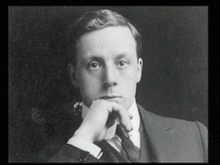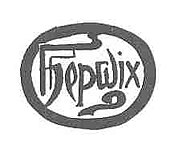Cecil Hepworth
Cecil Milton Hepworth (born March 19, 1874 in Lambeth , London , † February 9, 1953 in Greenford , Middlesex ) was a British film director, producer, writer and actor. He is one of the pioneers of British film .
Life
With the entertainment industry Hepworth was familiar from childhood because his father magic lantern held -Vorführungen. He worked for Birt Acres and Charles Urban in the 1890s and wrote the first British book on film in 1897. With his cousin Monty Wicks, he founded the film production company Hepworth and Co., later renamed the Hepworth Manufacturing Company and then Hepworth Picture Plays. From 1899 they produced about three films a week in their studio in Walton-on-Thames , including numerous Phantom Rides . The better-known short films of this early period include How It Feels to Be Run Over (1900) and the recordings of the funeral procession for the late Queen Victoria from 1901. In 1903, Hepworth created the first cinematic adaptation of Lewis Carroll's Alice in Wonderland , which, however, on narrative level is inadequate and almost inaccessible without knowledge of the material.
Rescued by Rover (directed by Lewin Fitzhamon ), produced by Hepworth in 1905 , was an overwhelming box office success. A collie was seen in the title role, Cecil Hepworth appears in this film in his last role as an actor. The individual scenes are cleverly put together and emphasize the action-packed plot. The film was shot twice, scene by scene, as the first two original negatives are said to have been worn out by making copies due to the great demand. The production of the film cost the then low sum of around 7 pounds, making Rescued by Rover one of the most profitable productions in film history.
In the 1910s, he mass-produced goods for average public tastes and made Alma Taylor , Chrissie White and their film partner Henry Edwards local movie stars. The production company was active until the 1920s, but Hepworth's film style, unchanged since around 1910, with theatrical gestures and a fixed camera position, looked increasingly old-fashioned. In 1919, however, they had an international success with Alf's Button , the proceeds of which were immediately invested in a larger studio. After the financial disaster of Hepworth's second film adaptation of Comin 'Thro' The Rye (1923), the company went bankrupt in 1924. All tangible original negatives were melted down on the orders of the bankruptcy trustee in order to sell the silver obtained from them. Cecil Hepworth's last film was made in 1926.
In the following decades, Hepworth remained a sought-after contemporary witness . During the Second World War he made several educational and propaganda films for the British government. After World War II, he chaired the History Research Committee of the British Film Institute . In 1950 he was one of the first filmmakers to be awarded an Honorary Fellow by the British Film Academy . In addition, Hepworth was an honorary member of the Royal Photographic Society and the British Kinematograph Society .
Cecil Hepworth published his autobiography in 1951 under the title Came the Dawn: Memories of a Film Pioneer . He died two years later at the age of 79.
literature
- Cecil M. Hepworth: Came the Dawn. Memories of a Film Pioneer. Phoenix House, London 1951.
- Kevin Brownlow : pioneers of film. From silent films to Hollywood. Stroemfeld, Basel et al. 1997, ISBN 3-87877-386-2 (original title: The Parade's Gone By ... ).
Web links
- Cecil Hepworth in the Internet Movie Database (English)
- Cecil Hepworth at screenonline
| personal data | |
|---|---|
| SURNAME | Hepworth, Cecil |
| ALTERNATIVE NAMES | Hepworth, Cecil Milton (full name) |
| BRIEF DESCRIPTION | British film director, producer, writer and actor |
| DATE OF BIRTH | March 19, 1874 |
| PLACE OF BIRTH | Lambeth , London |
| DATE OF DEATH | February 9, 1953 |
| Place of death | Greenford , Middlesex |

